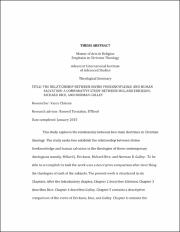The Relationship between divine foreknowledge and human salvation : a comparative study between Millard Erickson, Richard Rice, and Norman Gulley
Abstract
This study explores the relationship between two main doctrines in Christian
theology. The study seeks two establish the relationship between divine
foreknowledge and human salvation in the theologies of three contemporary
theologians namely, Millard J. Erickson, Richard Rice, and Norman R. Gulley. To be
able to accomplish its task the work uses a descriptive comparison after describing
the theologies of each of the subjects. The present work is structured in six
Chapters. After the introductory chapter, Chapter 2 describes Erickson. Chapter 3
describes Rice. Chapter 4 describes Gulley. Chapter 5 contains a descriptive
comparison of the views of Erickson, Rice, and Gulley. Chapter 6 contains the
summary and conclusion of the findings. In the process of data collection the
present work used primary sources.
After the process of research, it is evident that Erickson, Rice, and Gulley
have a very significant contribution in the theological discussion of divine
foreknowledge and human salvation. Their theologies are directly shaped by their
methods and presuppositions in such a way that their conclusions, in reference to
the subject in study, can be predetermined just by understanding their background
and methods of doing theology. The results demonstrated that one’s construction of
God has a direct effect in how he/she perceives God’s action in history.
Erickson, Rice, and Gulley agree through their theological construction that
the Bible teaches divine foreknowledge and that it is because God has the
knowledge of the future that the provision of salvation is made sure.


